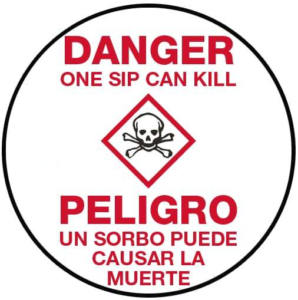The “Restricted Use Pesticide” classification, and the reason for RUP classification must appear at the very top of the label’s front panel directly under the phrase “Directions for Use”. EPA may assign a restricted use classification when it has determined that the pesticide product, or its use, has a high acute toxicity; has a history of accidents; may cause oncogenic effects (tumors), teratogenic effects (birth defects), fetotoxic effects (harm to a developing fetus), or reproductive effects (such as a lowered sperm count); can leach into ground water; or can harm wildlife.

On a case-by-case basis, some product-specific RUP statements may be more restrictive based on risk management decisions by EPA. Paraquat is a recent example. Paraquat dichloride (also referred to as paraquat) is highly toxic to humans. One small accidental sip can be fatal, and there is no antidote. Dermal or eye contact can also have serious lasting effects. A combination of public concern and EPA’s evaluation of incident data prompted an in-depth statistical analysis of paraquat incidents ahead of the typical mitigation phase of Registration Review.
In order for pesticide products containing paraquat to meet the FIFRA standard for registration, EPA determined the following risk mitigation measures were necessary for continued registration of paraquat:
- Use of paraquat is restricted to certified pesticide applicators only.
- Non-certified persons working under the supervision of a certified applicator are prohibited from using paraquat (including mixing, loading, applying the pesticide, and other pesticide-related activities);
- Applicators are required to take an *EPA-approved paraquat training program every 3 years in order to mix, load, apply, or handle paraquat;
- Changes to the pesticide label and warning materials (see cap seal above) to highlight the toxicity and risks associated with paraquat; and
- New closed-system packaging designed to make it impossible to transfer or remove the pesticide except directly into the proper application equipment.
*For detailed information on EPA-required training see April 14, 2020 post “Paraquat Training for Certified Applicators“.